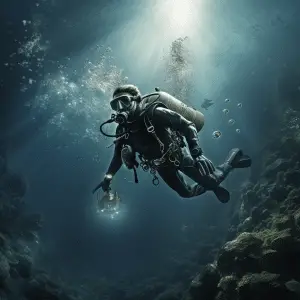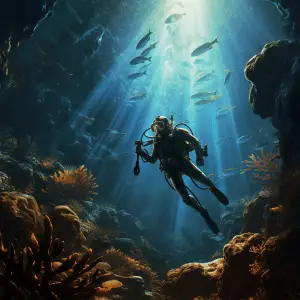Introduction to Scuba Diving
Scuba diving is an exciting underwater experience. It lets people explore the ocean and discover a new world below the surface. With training and proper equipment, anyone can become a certified scuba diver and take on this extraordinary journey.
Those who are interested in diving get comprehensive training courses. These classes teach essential abilities like buoyancy control, breathing techniques, and underwater communication. Divers learn safety measures to make sure they’re safe during dives.
When the basics are done, divers can try advanced training programs. For example, deep diving courses let them dive to greater depths and see amazing sea life that lives there. Underwater photography classes teach divers how to take beautiful pictures of the colourful underwater scenery.
A suggestion for aspiring scuba divers is to invest in good quality diving equipment. A good wetsuit, mask, fins, and regulator can make dives more comfortable and secure. Also, properly maintaining equipment makes it last longer and work better.
Another suggestion is to join a scuba diving community or club. By connecting with other divers, enthusiasts can share info, swap experiences, and find new dive sites. These communities may organize trips to popular dive destinations, giving divers a chance to explore and make new friends.
Lastly, it’s important for divers to be eco-friendly while exploring underwater ecosystems. Responsible diver habits, like not touching marine life or delicate corals, keep these delicate environments for future divers to enjoy.
By following these suggestions, people can enjoy the world of scuba diving, stay safe, and help take care of the ocean.
The Role of a Scuba Diving Instructor

Scuba diving is an electrifying activity that lets people discover the amazing underwater world. To guarantee safety and offer a marvelous experience, the job of a scuba diving instructor is crucial! They instruct students in the essential techniques and skills for scuba diving. Educating divers on the potential risks involved in this thrilling sport, and stressing safety procedures is also their responsibility.
Instructors supervise dives to make sure everyone is safe and monitor their performance during dives. They guide divers through unknown dive sites, showing off fascinating marine life and keeping everyone in specified areas.
Mentoring divers to better their abilities and conquer difficulties, instructors also have an in-depth understanding of marine biology and ecosystems to teach divers about the underwater environment’s charm and delicacy.
Moreover, aside from technical knowledge, splendid communication skills are necessary for a scuba diving instructor. They must communicate without complex words or unclear hand signals.
So don’t miss out on becoming a certified scuba diving instructor! Join this meaningful occupation today and take off on remarkable voyages under the sea. Dive into responsibility and safeguarding others, a scuba diving instructor is a true deep-sea superhero!
Responsibilities of a Scuba Diving Instructor
Scuba Diving Instructors are responsible for teaching and guiding divers in the underwater realm. Their job is to ensure safety and develop skills, whether training novices or advanced dives.
Instructors must:
- Teach: Through lectures, pool sessions, and open water dives.
- Supervise Safety: During all aspects of a dive, like equipment checks, buddy checks, and emergency procedures.
- Plan Dives: Considering weather, dive site suitability, and diver experience.
Also, they must perform equipment maintenance, promote marine conservation, and motivate their students.
Pro Tip: To be a successful Scuba Diving Instructor, improve your diving skills and knowledge. Stay calm when your students mix up their oxygen tank and coffee mug.
Skills and Traits of a Successful Scuba Diving Instructor
Scuba diving is a thrilling sport that needs skilled and knowledgeable instructors to guide and teach aspiring divers. A successful scuba teach has a unique set of skills and traits to make them great!
- Tech Knowledge: A scuba instructor must understand the technical aspects of diving, like equipment use, safety rules and underwater navigation.
- Communication: Good instructors have to explain things clearly both on land and underwater. This way divers can understand and follow directions, making it a safe and fun experience!
- Patience & Flexibility: Teaching scuba diving can be tricky at times, especially for beginners. A pro instructor will be patient and adapt their teaching to match each individual’s needs.
- Safety First: Safety must be a priority for a scuba instructor. They must watch out during dives, assessing any risks, and ensuring all participants follow proper protocols.
Beyond tech knowledge, scuba instructors can take it up a notch with hands-on activities like simulated emergencies or quizzes. These make learning more engaging and reinforce important skills for real-life situations.
Knowing students’ names is also helpful in creating a welcoming environment. Using names builds a personal connection and makes students feel part of the diving community.
Also, providing meaningful feedback helps students improve their skills and motivate them to keep diving. Focus on both strengths and areas of improvement to encourage progress.
Career Paths and Opportunities for Scuba Diving Instructors
Scuba diving instructors have many options for their career. Five to consider:
- Dive Centers: Teaching recreational divers and guiding them underwater.
- Liveaboard Cruises: Leading dives in exotic places and giving personalized instruction.
- Dive Resorts: Doing training programs, dive excursions, and equipment maintenance.
- Marine Conservation: Educating people and monitoring reef health.
- Technical Diving: Advanced diver training in deep and complex environments.
Plus, there are chances to specialize in subjects like photography or search and recovery. Having a strong network in the diving industry can lead to freelance teaching, consultancy roles, or even owning a dive shop. Instructors need strong leadership, communication skills, and knowledge of dive safety.
Let’s hear a story about scuba diving instructors:
Years ago, Sarah found herself captivated by the ocean during her first dive. She dedicated herself to becoming an instructor and got experience at dive centers. Combining her love for diving and marine conservation, Sarah joined an organization to protect coral reefs and became part of their outreach programs. Now she teaches diving and educates people about our underwater ecosystems. Her job as a scuba diving instructor has given her fulfilling career opportunities and a chance to make a difference. If you want to dive every day, then being an instructor could be your dream job!
Tips for Becoming a Scuba Diving Instructor

If you want to become a scuba diving instructor, here are some top tips to assist you:
- Get Certified: Become a certified scuba diver first. This will give you the fundamental knowledge and skills necessary to teach others.
- Master Your Abilities: Spend time honing your own scuba diving skills and acquire experience in various underwater settings. The more adept and knowledgeable you are as a diver, the better teacher you’ll be.
- Obtain Additional Qualifications: Think about getting specialized certifications like rescue diving or nitrox diving. These extra qualifications will make you stand out and increase your teaching potential.
- Gain Teaching Practise: Look for chances to help experienced instructors or follow them during their classes. Practising teaching techniques and observing various teaching styles will enhance your own abilities.
- Boost Communication Expertise: Effective communication is essential when teaching others underwater. Work on providing clear and concise instructions, as well as good listening skills to reply to any worries or questions from your students.
- Stay Up-to-date with Industry Developments: Stay abreast of the most recent advancements in scuba diving equipment, safety protocols, and teaching techniques. This continual learning will allow you to offer the best experience possible.
It’s also important to note that becoming a scuba diving instructor requires dedication, patience, and a true love for sharing the beauty of the underwater world with others.
Now, let’s look into some unique info about becoming a scuba diving instructor:
To further boost your credibility as an instructor, consider obtaining extra credentials through organizations such as PADI (Professional Association of Diving Instructors) or SSI (Scuba Schools International). These certifications have great value in the industry and will display to potential employers or clients that you have met stringent training standards.
Another point worthy of mentioning is that while technical dive training can be difficult, it can also be incredibly gratifying. As an instructor, you’ll have the opportunity to lead divers through advanced techniques such as wreck diving, deep diving, and cave diving. These specialized areas of expertise can open up new possibilities for teaching and exploration.
Now, let’s uncover a real story related to becoming a scuba diving instructor:
One remarkable tale is that of Jacques-Yves Cousteau, an innovator in scuba diving and marine conservation. Cousteau not only invented the Aqua-Lung (the first commercially successful open-circuit scuba system), but he also co-founded the French Underwater Research Group. His dedication to exploring the depths of the ocean and sharing his knowledge with others encouraged countless individuals to become passionate about scuba diving.
Beneath the surface of every successful scuba diving instructor lies a compilation of inspiring stories, peculiar fashion decisions, and an amazing ability to avoid getting pruney.
Conclusion: The Fulfilling Career of a Scuba Diving Instructor
Do you dream of a career immersed in the wonders of the underwater world? Becoming a scuba diving instructor may be for you! Guide others through their diving experiences and witness the joy and excitement on their faces. Travel to breathtaking dive sites around the world and gain advanced certifications. Join the scuba diving community and make lifelong friendships.
It all started in 1943 with Jacques-Yves Cousteau and Émile Gagnan. They invented the demand valve regulator which revolutionized underwater exploration. Now, you can breathe comfortably underwater for extended periods of time!
So, if you’re seeking adventure, passion, learning, and connection with nature, consider becoming a scuba diving instructor. You won’t just get fulfillment beneath the surface of the water, but also within your own soul.
